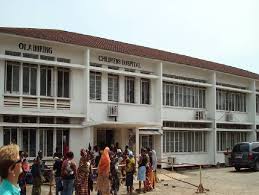ICT Utilization Is Pivotal In Health Care Service Delivery
Poverty has deepened the crisis in Health Care Service Delivery in developing countries, particularly Sub-Saharan Africa, a region facing a disease burden that is unmatched in the world. It is vivid that, urban areas in countries below the Sahara desert have had a significant growth in Internet access in the last decade for which Sierra Leone is no exception. This growth has set the stage for not only Health Care Workers to now utilize ICTs to record and access relevant Health Care Information for communication purposes but for also planning and sustainable implementation of health interventions.
In Sierra Leone, data management has been one of the most challenging issues affecting the country to maintain quality data on health care services, resulting to serious data quality problems, thereby negatively impacting health indicators and by extension limiting proper planning to address the numerous challenges faced by the Ministry of Health and Sanitation in Health Care Service Delivery.
However, this is gradually changing as the Ola During Children’s Hospital which is now a success story has effectively utilized the opportunities that come with the use of Information Communication Technologies through a mobile based platform called VAX-TRACK to improve data/information management system on immunization right at the health facility. The technology is a simple user friendly mobile based technology that is used to record accurate information on vaccination; date of next vaccination visit, total children registered and vaccines administered. This tool can also help to track performance of the health facility. It supports health care workers to provide quality immunization services and it also has a reminder system to alert for the next date of immunization. More importantly, the technology also tracks children that are defaulted for immunization. This means, there is now a gradual shift from analog (paper based) to digital based recording of health information/data on immunization in Sierra Leone through the use of a simple mobile based technology.
“If we are to effectively utilize the benefits of ICTs to improve Health Care Service Delivery, the already utilized mobile based tools in country should be synchronized with the District Health Information System 2 and the Health Management Information System, with the Ministry of Information and Communication and the Department of Policy, Planning and Information in the Ministry of Health and Sanitation taking the lead”
Beside VAX-TRACK which is only limited in Western Area Urban as a pilot , there are host of other mobile based tools used for different interventions to improve health care service delivery in the country like U-Report, Rapid Pro, CUMM-CARE, Akvo-Flow, Kobo Collect to name but a few. CUMM-CARE is used to collect date on immunization and Maternal issues while Akvo-Flow and Kobo Collect are used in data collection on different Health Interventions in different parts of the country, with support from NGOs, Faith Based Organizations, and UN Agencies etc. Even, as I write plans are underway to introduce another mobile based platform called Maternal-App, which is adapted to capture data on maternal health related issues in the country. Also, a new electronic case based disease surveillance system is being utilized by the Disease Surveillance Programme in the Ministry of Health and Sanitation for reporting of specific diseases and healthy conditions in the country.
The Missing Link
It is true that all of these fantastic electronic mobile based tools are being used to improve health care service delivery in the country. However, there has been a missing link to synthesize/synchronize information gathered from the different health interventions in the country to the District Health Information System 2 and the Health Management Information System, which are the set standards. This concern has also been raised by the Department of Policy Planning and Information in the Ministry of Health and Sanitation, finding it difficult to capture a holistic data on Health Care Service Delivery, thereby creating inconsistencies in the date management of the health sector.
Efforts to Synchronize ICTs for Health
On Friday august 24th this year, a meeting comprising of key stakeholders was held at the Sierra Leone Police Officers’ Mess at Kingdom in collaboration with the Ministry of Information and Communication and the Department of Policy, Planning and Information to validate the draft National eHealth Strategy: 2018-223, which was a laudable effort. The Strategy pinpoints the vision of the contrary to achieve by 2023 an effective ICTs support system that can aid delivery of quality, accessible, affordable, equitable and timely health care services, thereby bringing Sierra Leone closer to achieve universal health care coverage. .
Challenges of ICTs Utilization
It’s obvious that Information Communication Technologies (ICTs) do not exist in vacuum, they need power, human resource and internet. For, ICTs to thrive to improve Health Care Service Delivery ; the required structures should be put in place, as ICTs have the potential to improve Health Care Service Delivery , just as countries like Kenya, Ghana, Uganda have utilized the benefits of ICTs to improve health care service delivery.
Firstly, majority of these mobile based tools need electricity supply which is a major issue in most of Sierra Leone’s rural communities, where majority of these tools are utilized.
Secondly, internet access is another major issue that poses threat to the use of ICTs for sustainable Health Care Service Delivery in the country. Even, with the massive expansion of mobile GSM operators and Fiber Optic Connectivity, the country still faces challenges to access internet in hard to reach areas.
Why this is a major challenge!
For instance, when using Akvo-Flow in data collation, one needs to sync the information gathered. With that, internet is needed for data to be transmitted to the central dash board for analysis. This is the same for all other internet based data collection tools.
Another key challenge identified is the level of knowledge of health workers on mobile technology applications, thereby creating deficiencies in interfacing with these electronic mobile based information gathering and sharing tools.
Recommendations
As I end this piece, below are four key thematic areas this writer would like to pin point as the way forward to ensure positive utilization of ICTs/mobile technologies to achieve a sustainable health care service delivery in the country.
- All mobile based applications on health Care Service Delivery should be directly coordinated by the Ministry of Information and Communication and the Department for Policy, Planning and Information in the Ministry of Health and Sanitation , thereby creating the synergy between information captured from the different health interventions to the District Health Information System and the Health Management Information System, which are the standards for data management for health Care Service Delivery in the country.
- In as much as rural communities are challenged with electricity supply, partners working on mobile based applications in these communities should embark on needs assessment to identify what works well and possible alternatives to address the power constraint.
- Since Internet access is still a big bottle neck, it can be addressed by adapting a non-interment based system in which information gathered on Health Care Service Delivery is recorded and transferred without any form of internet connectivity.
- Lastly, it is vivid that certain health workers cannot properly interface with mobile technologies, thereby negatively impacting the quality of information gathered. Therefore, this writer would like to see periodic hands on training of health workers on mobile based technologies to ensure quality and consistent data management of Health Care Service Delivery in the country.
By Ibrahim Sorie Koroma, Health Education Officer-HED/MoHS
Stay with Sierra Express Media, for your trusted place in news!
© 2018, https:. All rights reserved.






